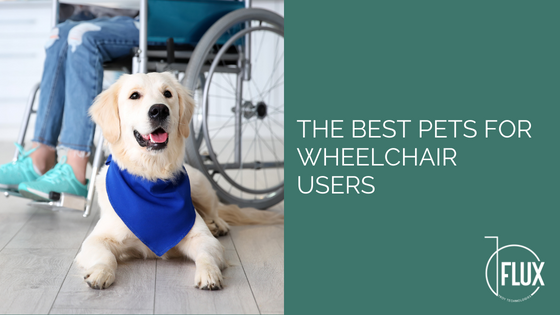7 Best Pets for the Disabled Community
For those in wheelchairs, having a pet can be both a joy and a challenge. But with the right type of pet, you can minimize the challenges and experience great companionship, entertainment, and joy. Here is our list of the 7 best pets for the disabled community:
1) Dogs
Man's best friend! From small breeds to large ones, dogs provide companionship, emotional support, and love. With their intelligence and obedience training, many dogs are great around wheelchairs. They may even give you an extra helping hand by picking up dropped items or bringing things to you when needed!
Service dogs are another good option depending on your needs. They can provide deeper emotional support and physical assistance based on the needs of the owner. They are specially trained to help their owners with daily tasks like opening doors, retrieving items, providing balance support, and more. If you feel that a service animal would benefit your lifestyle, make sure to research the proper steps of getting one – it can be a lengthy process, but well worth it in the end!
2) Cats
A cat might be the perfect fit if you're looking for an independent pet that can keep itself occupied while giving you lots of cuddles. Plus, many cats enjoy being around people and wheelchairs – they may even curl up in your lap for a nap occasionally!
3) Horses
Though not typically thought of as a pet for the disabled, horses are very beneficial for people in wheelchairs. With specialized riding programs, you can have a wonderful time bonding with your horse while taking lessons or going on trail rides. Riding them can be great exercise and provide a sense of freedom. Horse riding requires significant physical strength, so if you’re interested in this activity, make sure to discuss it with your doctor or physical therapist first.
Horses can also be service animals! Aside from dogs, miniature horses are the only other service animal approved by the Americans With Disabilities Act. Similar to service dogs, service horses are specially trained to support their owners with tasks such as retrieving items, supporting their owner’s balance, and providing emotional support. Just like with a service dog, make sure to research the proper steps of getting one ahead of time.
4) Fish
Fish make quiet yet colorful companions that bring life and motion to any room. Watching them swim around peacefully is often very calming – plus, they don’t need much upkeep beyond basic tank maintenance!
5) Hamsters
Rodents like hamsters, guinea pigs, and gerbils are energetic and fun to watch. They’re also very low-maintenance and don’t take up much space.
6) Reptiles
Reptiles such as turtles, snakes, and lizards can be great companions for people with disabilities as long as they’re cared for properly. Reptiles are cold-blooded and often require special heating lamps. Do your research beforehand to know what kind of environment these creatures need and how to provide it.
7) Birds
Some birds are quite friendly and trainable – parrots, in particular! They often become attached to their owners and enjoy interacting with them. Plus, like fish and hamsters, birds require relatively little upkeep compared to other kinds of pets. It’s important to know, however, that some bird species, like parrots, have a long lifespan and can live for decades. Be sure you are ready for that kind of commitment ahead of getting a bird for yourself.
Do Your Research Ahead of Time
Your lifestyle and preferences will guide you toward selecting the perfect animal companion. Take time to do your research and take into consideration factors such as space, availability, and cost. Whatever pet you decide is best for you and your lifestyle, we would love to hear about it! Send us a photo of you and your pet on social media!

